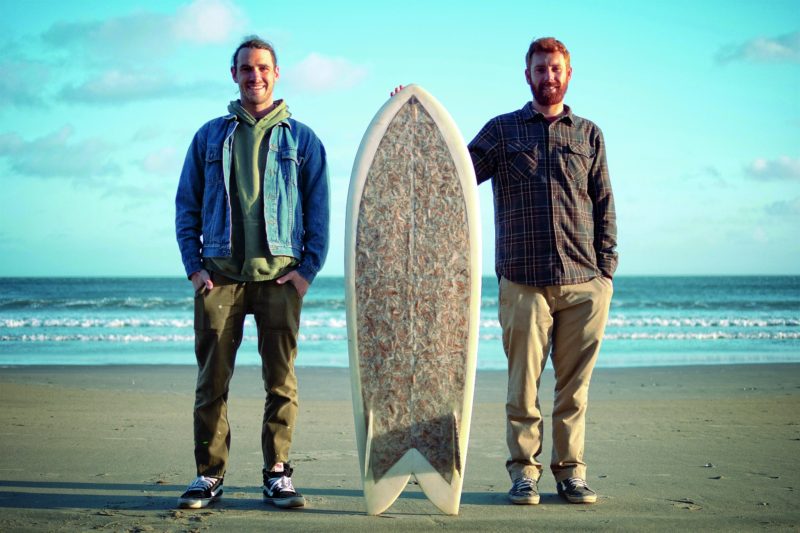
The fifth floor of the Arts Block was graced with the presence of two surfers and their three very unusual surfboards on Wednesday evening. I’ll be the first to admit that I don’t know anything about surfing other than the objective: to stand up on a piece of plastic in the ocean. But on Wednesday, I learned a lot more, and all from the charming Ben Judkins and Taylor Lane, who have turned the surfboard on its head and crafted their own boards using cigarette butts they have collected along the shore.
Judkins and Lane entered a competition run by Visalia Surf Company, in collaboration with the Surfrider Foundation, to create a “surf craft” using upcycled materials. The story goes that they were looking at the ground and wondering what they could possibly make their surf craft out of when Judkins said: “Hey, what about cigarettes?” Lane responded: “No way dude!” But they did it, and after a few tweaks to stop their board absorbing the seawater and “leaking ciggy juice”, they crafted a functioning surfboard made with cigarette butts and took it out to sea. It was gnarly – which is a good thing, apparently.
Cigarettes may not be spoken about as often as coffee cups in the zero-waste movement, but they are actually the world’s most littered item, with 5.6 trillion cigarette butts thrown out each year. The butts are made of plastic – cellulose acetate – which means they will never fully decompose, and each butt contains thousands of toxic chemicals that leach out into the environment. Judkins and Lane have collected 4,000 cigarette butts from the California Coast and fashioned them into something they can “glide and slide” across the ocean with.
According to Taylor, “it’s really ironic that surfers are super privileged … we live our life around the surf and we have this intimate relationship with the ocean, and yet so many aspects of surfing are destroying the very thing that brings us joy”. They are using the surfboards – they have now made seven of them – to travel the world and talk to people about “ocean mindfulness and stewardship”.
Their talk to the Trinity Environmental Society and Trinity Surf Club was vibrant and laidback. The pair stood at the top of the room chatting and showing clips from films they had made along their travels with the ciggy board. Judkins has a degree in film, and the films they showed (available on their website thecigarettesurfboard.com) are filled with one beautiful shot of the ocean after another, with little specks of surfers bobbing along the top of the waves. Their aim is to show the majesty of the ocean and our carelessness towards it, and they’ve achieved this goal wonderfully in a series of mini-clips set to mellow music.
They are currently in the process of making a feature-length film documenting their journey and the people they meet along the way. And they’ve met some pretty interesting people, from Irish conservationist Easkey Britton to Jack Johnson (yes, “Banana Pancakes” Jack Johnson), both of whom can be seen surfing the board on their website.
The board itself was tricky to use at first, presumably due to its weight, but the surfers say they got the hang of it pretty quickly. The board makes a “hoot” noise as it cuts across the water and Johnson apparently tried to see whether he could change the frequency of the hoot as he surfed. He described the ciggy board as “taking a problem and finding out how you can be part of the solution but enjoying that process … just because it’s a heavy issue it doesn’t have to be a drag”.
The boards have taken Judkins and Lane from California to Costa Rica, France to Fiji and Ireland to Hawaii, and they take the conversation around the world with them. If their aim is to raise respect for the ocean and encourage people to make whatever changes they can in their lives, they certainly succeeded with the room of Trinity students.
I certainly left the room feeling both “mellow” and hopeful, with the wise words of Lane ringing in my ears: “There’s an idea that the individual has no power … but that’s what they want you to think, man!”






